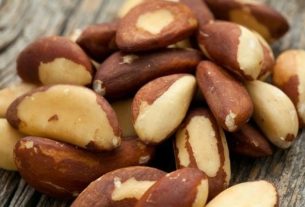Coenzyme Q10 is an enzyme naturally present in cells, which helps with energy production, reducing tiredness and improving physical and mental disposition.
It also has a strong antioxidant action, capable of strengthening the immune system and protecting cells against free radicals, and can help in the treatment of diabetes, high cholesterol, heart failure and high blood pressure.
Coenzyme Q10 can be obtained by eating foods such as meat, poultry and fish, but it can also be used in the form of supplements in capsules or tablets.

What is it for
Coenzyme Q10 brings several health benefits such as:
1. Improves mood
Coenzyme Q10 is essential for the production of energy in cells, being essential for improving mood during physical exercise.
Furthermore, this enzyme also reduces oxidative stress, promoting muscle recovery, reducing fatigue, and thus improving performance during training.
2. Prevent cardiovascular diseases
Coenzyme Q10 is a powerful antioxidant that improves artery function and prevents the formation of fatty plaques, helping to prevent the emergence of cardiovascular diseases, such as high blood pressure, atherosclerosis and heart attack.
Some people with high cholesterol and who use statin medication may have reduced natural production of coenzyme Q10. In these cases, it is believed that taking Coenzyme Q10 supplements can reduce the side effects of statins, such as muscle pain and cramps.
3. Treat heart failure
Some studies (1) (2) show that supplementation with coenzyme Q10 improves the functions of the arteries, preventing complications of heart failure, such as kidney failure, liver damage, heart attack and even death.
4. Improve brain health
Coenzyme Q10 is essential for energy production and blood flow in the brain, helping to improve mental disposition, memory and concentration. See other supplements to improve memory and concentration.
Thus, coenzyme Q10 balances the levels of this enzyme, which can help in the treatment of depression and the prevention of diseases such as dementia, Parkinson’s and Alzheimer’s. However, more studies are needed to confirm the benefits of coenzyme Q10 in these conditions.
5. Prevent premature aging
Due to its antioxidant properties, coenzyme Q10 helps protect the skin against free radicals and ultraviolet rays from the sun. Therefore, when used in the form of supplements or creams, coenzyme Q10 can prevent the formation of wrinkles on the skin, helping to prevent premature aging.
6. Relieve Fibromyalgia Symptoms
As coenzyme Q10 has antioxidant action, supplementation with this enzyme has been used to alleviate the symptoms of fibromyalgia, such as pain, fatigue, morning tiredness and depression. Learn more about the symptoms of fibromyalgia.
7. Prevent cancer
Due to its antioxidant properties, coenzyme Q10 strengthens the immune system and protects cells against damage caused by free radicals, which can help prevent the onset of cancer.
Despite these possible benefits, more studies are needed to confirm the use of coenzyme Q10 in cancer prevention.
8. Improve fertility
As we age, natural levels of coenzyme Q10 in the body decrease, leaving eggs and sperm more susceptible to damage caused by free radicals.
Thus, supplementation with coenzyme Q10 can improve fertility, improving the quantity and quality of sperm in men and eggs in women. See other tips to improve fertility.
Does coenzyme Q10 help you lose weight?
Coenzyme Q10 works to produce energy in cells, improving energy during physical exercise, which promotes the burning of body fat and, consequently, can help with weight loss.
However, there are still no studies that prove that coenzyme Q10 directly affects weight loss.
Foods rich in coenzyme Q10
The following table shows the amount of coenzyme Q10 present in every 100g of food:
Furthermore, some vegetables and fruits, such as broccoli, spinach, garlic, avocado, apple, for example, also contain small amounts of coenzyme Q10.
It is important to remember that to obtain all the benefits of coenzyme Q10, you must maintain a healthy and varied diet. See how to eat healthy.
When to take coenzyme Q10 supplements
Coenzyme Q10 supplements are generally recommended by a doctor or nutritionist for the elderly and people who use statins, which are medications used to control blood cholesterol levels.
The use of coenzyme Q10 supplements may also be indicated to prevent the complications of heart failure, improve performance during physical exercise and alleviate the symptoms of fibromyalgia, for example.
Coenzyme Q10 supplements can be found in the form of ubiquinone or ubiquinol and may contain only these enzymes or be associated with vitamins and minerals. Generally, the recommended dose of this supplement is between 50 mg and 200 mg once a day, varying depending on the objective being treated by the doctor or nutritionist. There are also some creams with coenzyme Q10 in their composition, which help prevent premature skin aging.
Possible side effects
Taking Coenzyme Q10 supplements can cause some side effects, such as stomach discomfort, insomnia, nausea, vomiting and diarrhea.
Other rare side effects with the use of coenzyme Q10 supplements include dizziness, light sensitivity, irritability, headache, heartburn, involuntary movements, and fatigue.
Who shouldn’t use
The use of coenzyme Q10 supplements is not recommended for children or people with kidney or liver disease. People who are undergoing chemotherapy treatment should also not use coenzyme Q10 supplements.
Pregnant or breastfeeding women should also not use coenzyme Q10, as there are no studies that prove the safety of this supplement in these situations.
People who use hypoglycemic medications, warfarin or theophylline, or who have hypoglycemia, should only use coenzyme Q10 under the recommendation and supervision of a doctor.

Sign up for our newsletter and stay up to date with exclusive news
that can transform your routine!
Warning: Undefined array key "title" in /home/storelat/public_html/wp-content/plugins/link-whisper-premium/templates/frontend/related-posts.php on line 12
Warning: Undefined array key "title_tag" in /home/storelat/public_html/wp-content/plugins/link-whisper-premium/templates/frontend/related-posts.php on line 13




